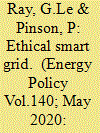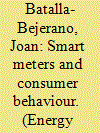|
|
|
Sort Order |
|
|
|
Items / Page
|
|
|
|
|
|
|
| Srl | Item |
| 1 |
ID:
116419


|
|
|
| 2 |
ID:
126517


|
|
|
|
|
| Publication |
2013.
|
| Summary/Abstract |
An ever-increasing body of research explores the effectiveness of Home Energy Management Systems (HEMS) in achieving energy savings in households. To date, however, the overall life cycle impact of the HEMS itself has not been taken into account. Thus, no assessment has been made whether the amount of energy saved (esaved) outweighs the energy needed for production, use and disposal (einvested). Therefore, an eco-cost and a Cumulative Energy Demand (CED) method were used to analyze three distinct types of HEMS. Based on the literature, six scenarios were developed in order to find the break-even point, where einvested=esaved. The results show that the overall impact is dependent on the type of HEMS, and that if the duration of use is short and the achieved savings are small, the benefits do not always outweigh the environmental costs. Care should be taken not to develop HEMS with unnecessarily elaborate parts or functionalities and that their own electricity consumption is minimized. The paper concludes by discussing the implication for polices concerning the implementation of smart meters and HEMS and their design.
|
|
|
|
|
|
|
|
|
|
|
|
|
|
|
|
| 3 |
ID:
176747


|
|
|
|
|
| Summary/Abstract |
The European Union is implementing ambitious programs to tackle energy efficiency, energy independence, and climate change challenges. To reach the 20/20/20 targets, the EU aims at modernizing power grids to make them ‘smart’ by collecting close to real-time data and subsequently operate grids more optimally. One of the smart grid purposes is to integrate a growing share of renewable generation while efficiently accommodating their variability and limited predictability through the actuation of consumer flexibility. Hence, the success of energy programs relies on customer involvement in altering their energy consumption through the use of analytics and incentive-based demand-side management. The rollout of smart meters throughout Europe should provide the necessary information to implement them. This is without accounting for a possible backlash of customers in response to bad practices of utilities when it comes to digitization and smart meter rollout, also associated with the potential distrust of digital products. Beyond legal binds and technical obstacles, the possible ways of handling the rollout of smart meters and metering, which defines the relationship between customers and utilities, are multiple. However, only the practices that exhibit ethical behavior of the utilities towards customers, and consider them as stakeholders in smart grids will lead to a fruitful and long-lasting relationship between customers and utilities.
|
|
|
|
|
|
|
|
|
|
|
|
|
|
|
|
| 4 |
ID:
125555


|
|
|
|
|
| Publication |
2013.
|
| Summary/Abstract |
The advent of large samples of smart metering data allows policymakers to design Feed-in Tariffs which are more targeted and efficient. This paper presents a methodology which uses these data to design FITs for domestic scale grid-connected PV systems in Ireland. A sample of 2551 household electricity demand data collected at 1/2-hourly intervals, electricity output from a 2.82 kWp PV system over the same time interval as well as PV system costs and electricity tariffs were used to determine the required FIT to make it worthwhile for the households to invest in the PV system. The methodology shows that it is possible to design single, multiple and continuous FITs. Continuous FITs are the most efficient and result in no overcompensation to the housholder while single and multiple FITs are less efficient since they result in different levels of overcompensation. In the PV case study considered, it was shown that the use of three FITs (0.3170, 0.3315 and 0.3475 €/kW h) resulted in a 59.6% reduction in overcompensation compared to a single FIT of 0.3475 €/kW h; assuming immediate and complete uptake of the technology, this would result in NPV savings of over €597 m to the Irish government over a 25 year lifetime.
|
|
|
|
|
|
|
|
|
|
|
|
|
|
|
|
| 5 |
ID:
117239


|
|
|
|
|
| Publication |
2013.
|
| Summary/Abstract |
This paper aims to address two timely energy problems. First, significant low-cost energy reductions can be made in the residential and commercial sectors, but these savings have not been achievable to date. Second, billions of dollars are being spent to install smart meters, yet the energy saving and financial benefits of this infrastructure - without careful consideration of the human element - will not reach its full potential. We believe that we can address these problems by strategically marrying them, using disaggregation. Disaggregation refers to a set of statistical approaches for extracting end-use and/or appliance level data from an aggregate, or whole-building, energy signal. In this paper, we explain how appliance level data affords numerous benefits, and why using the algorithms in conjunction with smart meters is the most cost-effective and scalable solution for getting this data. We review disaggregation algorithms and their requirements, and evaluate the extent to which smart meters can meet those requirements. Research, technology, and policy recommendations are also outlined.
|
|
|
|
|
|
|
|
|
|
|
|
|
|
|
|
| 6 |
ID:
176729


|
|
|
|
|
| Summary/Abstract |
The introduction of smart technology and dynamic tariffs (such as time-of-use tariffs) provides multiple potential benefits for electricity markets. However, time-of-use tariffs generate additional complexity for consumer tariff choices in electricity markets. How well consumers can choose between tariffs, and whether certain tools improve these choices, are therefore important questions for energy regulators and policy makers. This paper presents an exploratory study that used experimental behavioural science to investigate consumer choice in electricity markets with time-of-use tariffs. A representative sample of consumers (n = 145) were given information about smart meters and time-of-use tariffs. A sequence of experimental tasks measured attitudes towards smart meters, comprehension of tariffs and quality of decisions between different types of electricity tariffs, where quality was judged against participants’ own perceptions of their electricity usage. The findings suggest that consumers struggle to match tariffs to usage accurately, with a general aversion to time-of-use tariffs that may lead to sub-optimal choices between tariff types. When participants chose between different priced time-of-use tariffs via an experimental price comparison site, decisions were significantly improved by a tool that personalised estimated costs. Policy implications include the importance of pre-testing interventions designed to improve consumer decisions.
|
|
|
|
|
|
|
|
|
|
|
|
|
|
|
|
| 7 |
ID:
111386


|
|
|
|
|
| Publication |
2012.
|
| Summary/Abstract |
Smart meters are being rolled out in large numbers throughout the world, with proponents claiming they are a critical step in the transition to a low-carbon economy. Yet there are significant unresolved negative reactions to smart meters, principally based on the concern that smart meters might be used to infer the private activities that occur within a dwelling. Though smart meter data is classified as personal data, and as such protected under existing data protection frameworks in the EU, there are relevant exceptions, notably where the data is required for legitimate applications associated with the performance of 'regulated duties'. This paper contributes to this debate by examining the data requirements for some of the proposed applications of smart meter data within the electricity supply industry, and investigates whether the use of personal data can be minimized or even avoided. The discussion includes system balancing, demand reduction, demand response and distribution network operation and planning, and indicates that, for most of these applications, the requirements for personal data can indeed be minimized. 'Privacy friendly' alternatives are discussed.
|
|
|
|
|
|
|
|
|
|
|
|
|
|
|
|
| 8 |
ID:
176910


|
|
|
|
|
| Summary/Abstract |
This paper summarises the insights to be gained from a systematic literature review of empirical research devoted to behavioural considerations associated with the use of smart meters and energy information feedback. Above and beyond the mass rollout of smart meters, there are various behavioural considerations that can affect the way in which consumers react to information enabling the adaptation of their consumption behaviour in response to dynamic pricing. Indeed, many empirical studies have been conducted in various countries aimed at determining how consumers respond to feedback on their consumption and prices. However, if users fail to demonstrate a pro-active attitude, they cannot hope to take advantage of the opportunities afforded by new technologies. By reporting a systematic analysis of bibliographic references, this article seeks to further understanding as to why consumers behave as they do when managing their demand, a process that, ultimately, is for the benefit of the electrical system, in particular, and of the whole of society, in general. The policy implications that emerge from our analysis highlight the heterogeneity of consumer engagement in demand management programs, depending on the degree of preference satisfaction achieved by means of personalised contract terms and the degree and persistence of consumer change, which are dependent on the cost, frequency and quality of information.
|
|
|
|
|
|
|
|
|
|
|
|
|
|
|
|
| 9 |
ID:
125470


|
|
|
|
|
| Publication |
2013.
|
| Summary/Abstract |
The fundamental role of policymakers when considering Advanced Metering Infrastructure (AMI), or 'smart meters for energy and water infrastructure is to investigate a broad range of complex interrelated issues. These include alternative technical and non-technical options and deployment needs, the cost and benefits of the infrastructure (risks and mitigation measures), and the impact of a number of stakeholders: consumers, distributors, retailers, competitive market operators, competing technology companies, etc. The scale and number of potential variables in the AMI space is an almost unprecedented challenge to policymakers, with the anticipation of new ancillary products and services, associated market contestability, related regulatory and policy amendments, and the adequacy of consumer protection, education, and safety considerations requiring utmost due-diligence. Embarking on AMI investment entails significant technical, implementation, and strategic risk for governments and administering bodies, and an active effort is required to ensure AMI governance and planning maximises the potential benefits, and minimise uncertainties, costs, and risks to stakeholders. This work seeks to clarify AMI fundamentals and discusses the technical and related governance considerations from a dispassionate perspective, yet acknowledges many stakeholders tend to dichotomise debate, and obfuscate both advantages and benefits, and the converse.
|
|
|
|
|
|
|
|
|
|
|
|
|
|
|
|
|
|
|
|
|